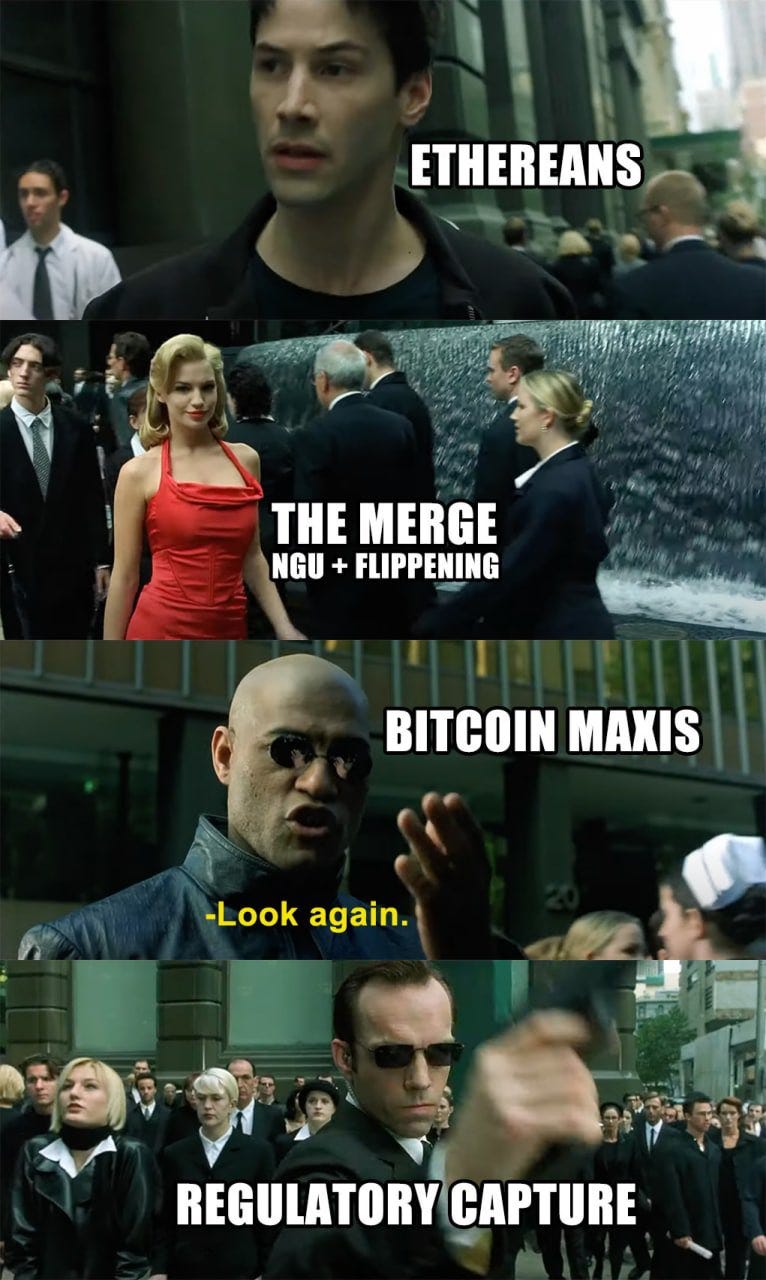What a time to be alive
Friday September 9, 2022 - Issue # 21
Happy Friday!
Okay, before I dive in to some crazy stuff happening in the world around us I want to take a second to mention that we are opening up a waitlist for early access to the new Satstreet trading portal! It has been nearly two years since we started developing a new trading experience with simplicity, speed, accuracy, and security all top of mind. The Satstreet team has worked tirelessly to build a new gold standard for secure trading in the digital asset space.
It is freakin’ awesome and I’m really excited to show you all what we’ve been cooking up behind the scenes. You can scan the QR code below or click here for early access!
I titled this article “What a time to be alive” because…oh man, I think we’re about to witness some crazy sh** over the next little bit. Global macro is facing such extreme pressures that it has almost completely overshadowed what could be the most important event in technology since the launch of Ethereum in 2015 — the Merge.
I won’t spend too much time on it because there’s a chance that it is delayed or that the Merge doesn’t go as planned. However, next week (Sept 13th-15th), Ethereum is expected to undergo the most consequential transformation in the history of crypto, when Ethereum will transition from a proof-of-work (PoW) consensus mechanism to proof-of-stake (PoS) consensus mechanism. If the Ethereum development team is successful, it will represent a massive feat of engineering and human coordination.
In short, Ethereum’s current PoW system is similar to the way that Bitcoin miners expend energy in order to validate transactions and secure the network — in turn they are rewarded in newly minted ETH and transaction fees for their efforts.
So, instead of miners, validators that stake (lock up) at least 32 ETH with the network are randomly selected to create blocks. The more ETH one stakes, the more likely one is to be selected and thus is rewarded with a mix of transaction fees and newly minted ETH.
No, this is not meant to decrease gas fees (Gwei) or do much for the speed of the network. What it does do, though, is cut Ethereum’s energy use by nearly 100% which Greta will certainly be excited about.
While I am bullish on Ethereum in general, I do have some concerns about this transition.
There is ~$200 billion (ETH’s current market cap) at stake If the Merge fails. A failure (or even another delay at this point) would not only be a devastating blow to confidence in the network (and subsequently the price of ETH) but it also risks wiping out other valuable projects are built on top of the network.
What’s most concerning about this $200 billion experiment, in my opinion, is that the transition to PoS could centralize the network and open up certain attack vectors that should not be taken lightly. The notion that all it takes is 32 ETH (~$50K USD) to run your own validator sounds good on the surface and it appears that it means a lower barrier to entry than the current PoW system which requires large amounts of capital for entities to participate in mining. A lower barrier to entry sounds great for decentralization but I think it’s important to dig a little deeper...
Staking 32 ETH (~$50K USD) to help secure the network is certainly noble. However, I’m not sure that the majority of ETH hodlers are that altruistic. Instead, I think that most will be compelled to delegate their ETH to large pools (large, centralized validators i.e. Coinbase, Binance, Lido, etc.) in order to be guaranteed rewards — pools will have a better shot at winning blocks since they will have large amounts of ETH staked, thus they are able to offer a yield to stakers. If the way I’m thinking about this is correct, then this opens up serious censorship risks, i.e. regulatory capture.
Headlines like this ^ are pretty disconcerting. With the recent ban on Tornado Cash still fresh in mind, many proponents are worried that crypto exchanges, which are also the key validators of Ethereum, will succumb to pressure and impose protocol-level censorship. Circle, the company behind the second largest USD-backed stablecoin USDC, set a pretty dangerous precedent when it followed the US Treasury sanctions against Tornado Cash and blacklisted the related addresses. The fear is that moves like this could start a trend of blacklisting and control that could be used by governments, regulators, and the like.
The Twitter thread is worth the click as it digs into these concerns in detail.
Coinbase CEO, Brian Armstrong chimed in saying that the exchange would prefer to close its staking service than comply with possible regulatory requests to censor Ethereum transactions.
But with $250 million to $600 million in revenue on the line for a publicly traded company, who knows which way they’ll lean.
The fact that these censorship risks are being openly discussed gives us no choice but to take them very seriously. Hopefully, these are just hypothetical scenarios that do not come to fruition but they are scary risks that inherently come with the transition from PoW to PoS.
As a proponent for decentralization I hope that these risks are mitigated and that the transition ends up being an amazing step forward for the Ethereum network and the space as a whole.
Ugh…I guess I did spend too much time on this. I’ll be back next week (hopefully post-successful Merge) with the other stuff I wanted to talk about.
Have a nice weekend!






